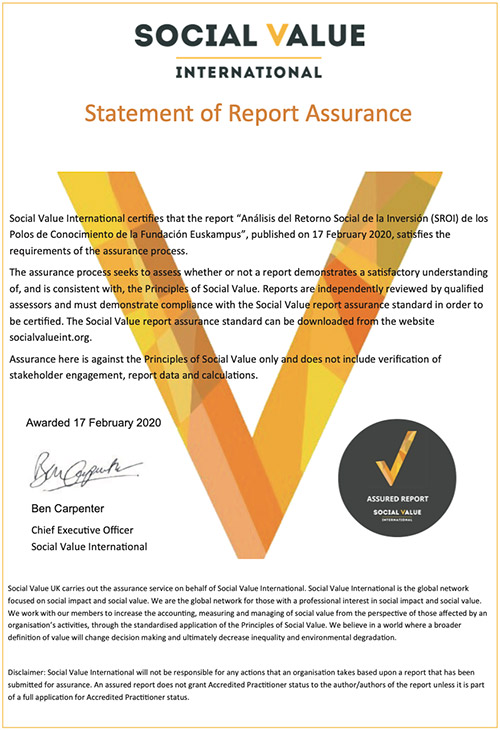Measurement of Social Impact

DEVELOPMENT PERIOD
2018-2020
WHAT IS IT?
Analysing the Social Return on Investment (SROI) of the Poles of Knowledge
MAIN PARTICIPATING ENTITIES
- UPV/EHU
- Tecnalia
- DIPC
- Basque Government
- BERC Achucarro, CSIC-UPV/EHU Materials Physics Centre, BioDonostia Institute
Description
Between late 2018 and March 2020 an internal project was set up to create a system to measure the social impact of the Poles of Knowledge, using the SROI methodology. The analysis examined the activities of the Poles of Knowledge in 2018, aiming to understand their impact on the researchers who formed part of the hubs’ co-creative processes, on the founding trustees, on other institutions involved in designing and implementing collaborative process and, lastly, on the Basque public authorities.
The study had twin aims. On the one hand, to find evidence to show the extent to which the Poles of Knowledge generate value for their stakeholders, with a view to informing impact management decision-making processes in the Euskampus Foundation, and, on the other, to better report the value created, particularly to their financial backers.
The process of determining the social return of the Poles of Knowledge included a wide array of the of methods and tools typically used to plan, monitor and measure social impact.
After counting up the inputs and gathering information to quantify outcomes, assigning monetary value and establishing the impact, the study found that the Poles of Knowledge generate a social return of €1.92 on every €1 invested.
The analysis confirmed that the Poles of Knowledge have a positive impact on their stakeholders, with the greater share of return going to the Basque public authorities and the founding trustees.
In terms of learning, several areas were identified where greater impact could be generated:
- First, developing actions that enable us to spread the impact outwards and balance the hubs’ mission of using a collaborative, interdisciplinary approach to respond to complex social challenges with the value perceived by their stakeholders.
- Second, reconsidering and segmenting activities aimed at researchers, supposedly the primary beneficiaries of the poles but nevertheless the group that benefited less in terms of social value.
- Third, getting together with the trustees to align and prioritise the primary areas of social impact and assign them clear metrics in order to determine the success of the poles and the Euskampus Foundation.
- Fourth, identifying the thematic areas most likely to harbour excluded stakeholders and design actions to mitigate negative impact down the road.
The study was awarded Social Value International (SVI) guarantee certification in February 2020. Social Value International is a global network focused on social impact and social value.
